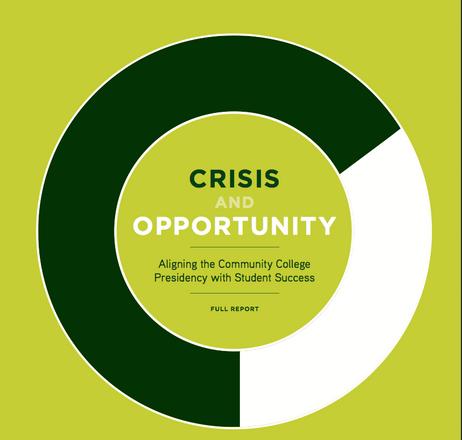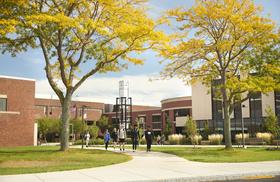At a time when more focus is on community colleges as a viable and cost-effective option in higher education, leadership at these schools appears to be in crisis. According to a recent report from the Aspen Institute and Achieving the Dream, a large percentage of community college presidents are slated for retirement over the next five years. Even more concerning is the fact that few appear poised to take over the helms of these institutions, leaving some to wonder where the direction of the community college system is headed.
The new report, titled, “Crisis and Opportunity: Aligning the Community College Presidency with Student Success,” was released at a National Forum in Washington D.C. in June. The report details the challenges facing community colleges in the upcoming years as they work to keep their key leadership positions filled with qualified candidates. The report identifies some of the specific problems that could contribute to a presidential shortage of community college presidents nationwide. It also provides recommendations that community colleges can follow to ensure their leadership does not suffer from the loss of a large number of current presidents in the next few years.
This lengthy video from the Aspen Institute describes the report in detail.
Primary Concerns Over the Coming Leadership Shortage
According to a recent report at Inside Higher Ed, more than 40 percent of the current community college presidents may retire within the next five years. That equates to the loss of more than 500 college presidents by 2017, leaving gaps in community college leadership that need to be filled by qualified individuals if these schools are to continue to thrive at their current levels. Unfortunately, that may be easier said than done, given the dwindling numbers of individuals heading into training programs that properly groom them for leadership positions at local community colleges.
The first concern is a practical one – there simply doesn’t seem to be enough students enrolling in academic programs that prepare them for college leadership. Inside Higher Ed reports that the most esteemed program for community college leadership, located at the University of Texas at Austin, has hit some recent bumps in the road. Those challenges have resulted in last year’s program seeing just four students, as opposed to the 12 to 15 that are typically enrolled in the program. This shortage could force community colleges to look down other avenues to staff their leadership positions in the near future.
This TEDTalk features Johanna Duncan-Poitier, the Senior Vice Chancellor for Community Colleges and the Education Pipeline for the State University of New York (SUNY).
The second concern with the impending shortage is the fact that current training programs in college leadership around the country do not seem to adequately address the various factors faced in college leadership today. The new report, which also features an analysis of the current leadership programs available, found that many are falling short in a few key areas. For example, courses in budgeting and finance did not offer consistent guidelines for measuring efficiency in campus operations.
Programs also tended to fall short in providing content in effective communication with faculty members and administrative staff. The report emphasized the need for making appropriate changes in current training programs for community college presidents that would take these gaps into consideration.
Five Qualities of Effective Community College Leaders
The Aspen Institute and Achieving the Dream also identified five qualities of effective community college leaders in their report, which include:
- Deep commitment to student access and success
- Willingness to take significant risks to ensure student success
- Ability to create long-lasting change within the community college system
- Strong, strategic vision for college and its students via external partnerships
- Ability to raise and allocate resources to promote student success
These five qualities were determined after members of the Aspen Institute and Achieving the Dream conducted in-depth research into the common characteristics of successful community college leaders. According to a press release at the Aspen Institute’s website, that research included a review of recent literature, multiple focus groups, and interviews with search consultants and current community college presidents. Unfortunately, researchers compiling this report also found that boards of trustees at community colleges are not weighing these specific factors when determining the best candidates for those leadership positions.
Trustees are looking to other characteristics when choosing the best candidates for leadership roles, including fiscal management ability, communication skills, fund-raising ability, and ethical behavior. While these qualities are also important in an effective leader, they neglect some of the qualities listed above, including a commitment to student success, the ability to lead change and a willingness to take risks.
Additional Recommendations
A report at the Kresge Foundation website also suggests community colleges will need to look beyond their immediate talent pool to find the leadership candidates they will require in the years ahead. However, representatives of both Achieving the Dream and the Aspen Institute warn that it will mean proper orientation for those outside the community college system to come into the system and effectively lead. Kay McClenney, director of the Center for Community College Student Engagement, agreed with that assessment, as well as the need to use caution in choosing candidates from outside the system.
In this video, Beverly Fletcher, Senior Director of Organizational Development and Change at Achieving the Dream, reflects on the role and importance of community college and its leadership, for the nation and for her own life.
“We’re going to have to be able to look in non-traditional places, because of sheer numbers,” McClenney told Inside Higher Ed. However, she added that coming “in knowledge-free is not going to work.”
The researchers that compiled this report urge community colleges to see this new turn of events as an opportunity as much as a problem. Josh Wyner, executive director of the Aspen Institute’s College Excellence Program, stated on the organization’s website, “We’re facing an urgent leadership challenge that also offers an unprecedented opportunity... It is time to not just name those qualities [of an effective leader], but translate what we know into action, to put much more effort into finding and grooming the next generations of leaders.”
Questions? Contact us on Facebook. @communitycollegereview














